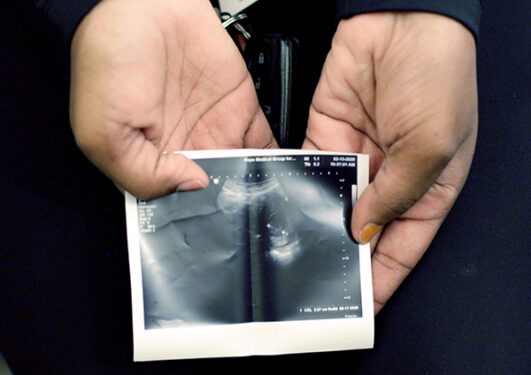NEW YORK — Texas bishops have applauded the Supreme Court’s decision not to block a new law banning most abortions in the state, noting it’s the first time the nation’s highest court has allowed a pro-life law to remain in place while litigation proceeds in lower courts.

“We celebrate every life saved by this legislation,” the state’s 20 bishops said in a Sept. 3 statement, adding that attempts by opponents of the law to “dehumanize the unborn are deeply disturbing.”
[Related: Texas’ 6-Week Abortion Ban is Law After Supreme Court Fails To Block It]
The legislation, known as the Texas Heartbeat Act, is one of the strictest pieces of abortion legislation in the nation prohibiting the procedure after the detection of a fetal heartbeat, which can be as early as six weeks into a pregnancy. Without action from the Supreme Court, it went into effect on Sept. 1, triggering a national debate.
In their statement, Texas bishops emphasized their stance that abortion is evil.
“Abortion is a human rights issue; the most fundamental human right is the right to life,” the bishops stated. “Abortion is not healthcare. Abortion is not freedom. Abortion does not help women. Abortion is never the answer. It is always the violent taking of innocent life.”
“We cannot turn away and say that, since the killing of another person takes place within the body of a woman, we as a society should not care, any more than when someone is killed within the privacy of a home or in a public venue,” the statement continued.
The Supreme Court, late on Sept. 1, voted 5-4 not to block the legislation. An unsigned opinion on the case acknowledges that the challengers of the law “have raised serious questions about the constitutionality of the Texas law,” but states they don’t sufficiently address the “complex and antecedent procedural questions” they present.
The opinion closes by explaining that the decision is not a conclusion on the constitutionality of the Texas law, and “in no way limits other procedurally proper challenges” to the legislation, leaving the door open for Texas abortion providers to find alternative means of challenging it.
There are at least 12 other states that have legislation banning abortions early in a pregnancy, but they have all been blocked by courts.
Chief Justice John Roberts joined Justices Sonia Sotomayor, Elena Kagan, and Stephen Breyer in dissenting votes. In separate dissenting statements, they focused on the law’s enforcement.
The Texas Heartbeat Act — signed by Texas Gov. Gregg Abbott in May — is unique in that it prohibits state officials from enforcing the ban. Instead, it allows private parties to sue an abortion provider or anyone who helped someone get an abortion after the limit and seek financial damages of up to $10,000 per defendant.
Roberts called the legislation a “statutory scheme” that is “not only unusual, but unprecedented.”
President Joe Biden, the nation’s second Catholic commander-in-chief on Sept. 2 called the Supreme Court’s decision “an unprecedented assault on a woman’s constitutional rights under Roe v. Wade” that “unleashes unconstitutional chaos.”
Roe v. Wade is the landmark 1973 Supreme Court decision that protects a women’s right to get an abortion. It holds that states can regulate abortions or prohibit them entirely in the third trimester, or week 27 on in the pregnancy.
“I am directing that Council and the Office of the White House Counsel to launch a whole-of-government effort to respond to this decision, looking specifically to the Department of Health and Human Services and the Department of Justice to see what steps the Federal Government can take to ensure that women in Texas have access to safe and legal abortions as protected by Roe,” Biden said in a statement.
Outside of Texas, U.S. bishops have largely been silent on the Supreme Court’s decision.
Bishop Donald Hying of Madison took issue with separate comments Biden made on Sept. 3 where the president said he “respects” those who believe life begins at the moment of conception but doesn’t agree.
“People always claim that President Biden was personally opposed to abortion. Today, we’ve all learned the painful and disturbing truth,” Bishop Hying posted on social media.
Differently, Bishop John Stowe of Lexington took aim at those who support the legislation as not necessarily pro-life individuals in the holistic meaning of the term.
“Those who vehemently fight legal abortion but are uninterested in providing basic healthcare for pregnant mothers or needy children, who are unconcerned about refugee children, or those who lacking quality education with no hope of escaping poverty cannot really claim to respect life,” Bishop Stowe wrote on social media.
Texas’s bishops included in their statement alternative resources for pregnant mothers including the Texas Pregnancy Care Network and the U.S. Catholic Bishops nationwide Walking with Moms in Need program. They also mention Rachel and Raphael’s Refuge, which is an organization that helps men and women suffering due to an abortion.
“We remain committed to assisting in and praying for the conversion of hearts and minds so all people will respect the dignity of human life,” they wrote.
